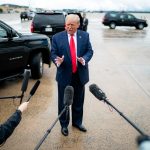President Donald Trump is taking bold steps to address the ongoing crisis in Ukraine, signaling a shift in U.S. foreign policy that emphasizes diplomacy over prolonged conflict. During a meeting with NATO Secretary General Mark Rutte, Trump expressed optimism about achieving a 30-day ceasefire between Ukraine and Russia, describing “positive signals” from recent talks with Russian President Vladimir Putin. While Trump’s peace initiative reflects his commitment to ending the war, skepticism remains high, as Putin has outlined extensive conditions for any agreement, including barring NATO membership and restricting foreign military presence in the region.
This peace effort comes at a critical juncture for the United States, where domestic challenges threaten to overshadow international diplomacy. Congress faces the looming threat of a government shutdown as lawmakers struggle to pass a budget resolution by midnight tonight. With partisan gridlock stalling negotiations, Senate Democrats have rejected the House-passed spending plan, demanding additional time to finalize full-year appropriations. Conservatives argue that Democrats’ refusal to compromise risks unnecessary chaos, potentially disrupting essential services like Social Security and defense funding. Speaker Mike Johnson has urged senators to act swiftly, framing the shutdown as a failure of leadership on the left.
Meanwhile, Trump’s administration is making waves domestically with EPA Administrator Lee Zeldin unveiling an ambitious deregulation package aimed at revitalizing the economy. The plan includes rolling back restrictions on power plants and oil and gas facilities, easing emissions reporting requirements, and reassessing wastewater management rules. Conservatives have praised these actions as necessary steps to restore American energy independence and reduce living costs for families. Critics on the left predictably decry the move as prioritizing industry profits over environmental protections, but Zeldin insists that economic growth and environmental stewardship can coexist.
In New York, Trump’s border czar, Tom Homan, has reignited debate over sanctuary city policies during a heated visit to Albany. Homan lambasted Governor Kathy Hochul for undermining public safety by shielding illegal immigrants accused of crimes from deportation. His call for stricter immigration enforcement aligns with conservative priorities to restore law and order in urban centers plagued by rising crime rates. Republicans applauded Homan’s hardline stance, emphasizing that sanctuary policies jeopardize community safety while rewarding lawlessness.
On a more hopeful note, grassroots activism is gaining momentum in food safety reform under Health and Human Services Secretary Robert F. Kennedy Jr. Meeting with industry leaders and advocates from the Make America Healthy Again (MAHA) movement this week, Kennedy pledged to eliminate harmful additives and improve transparency in America’s food supply. Conservatives have welcomed these efforts as a necessary pushback against corporate exploitation of lax regulations that compromise public health. The MAHA movement exemplifies how community-driven initiatives can hold powerful industries accountable while safeguarding future generations.
As Washington navigates these pressing issues at home and abroad, Trump’s leadership continues to challenge entrenched norms with bold strategies aimed at peace, prosperity, and security. Whether addressing international conflicts or domestic policy battles, conservatives see these developments as opportunities to advance principled solutions while holding adversaries accountable for their failures.




